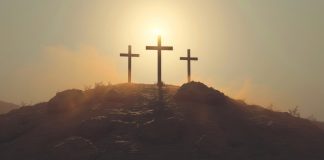COVID-19: Crisis prayer
A major crisis pushes us to re-evaluate the way we see and do things in the fields of health, finance, and social interaction. But how does this crisis affect our religious practices—especially the most common of these, prayer?
Why did Jesus have to die for us?
Taken as a whole, this question sounds like a painful cry, springing forth from the depths of the human being, in the midst of the darkness of uncertainty and doubt. This question, however, consists of multiple sub-questions. We will address these essential questions that will open our minds to the light of the teachings of Him who holds all knowledge and truth.
How to enjoy closeness in your relationship with God
Could we have a quality Christian ministry without an authentic relationship with God? Anyone can pretend in the short term, but to truly succeed in the long term you need a devotional life full of passion and a continual closeness to Jesus Christ.
Loving till we see an end to sad stories
We carry sad stories with us, and the meaning of these stories often eludes us. What if we discovered that these stories provide unique opportunities to change lives? Cori Salchert discovered, through family tragedy, the resolve and desire to take care of children with terminal illnesses.
Jesus’s atypical vocabulary
From the speech of Jesus, who was a perfect speaker, we would expect there to be no fiery insults or harsh terms.
Injustice and God: Is He the wrongdoer or the one wronged?
The concept of reward is one that encapsulates a world of joys, satisfactions, pleasant emotions, and accomplishments. It is usually correlated with what we do, what we say, who we are, and so on. We could say that it is an expression of our value in relation to the world. But any reward can be overshadowed by painful feelings when there is a...
Why I believe in God
If I could turn back time and return to my friend’s living room that day, when she was telling me with tears in her eyes that she wished she could believe, that she tries but is not able, I would probably find more appropriate words than I did then.
Love and cosmic cold
"We keep on being told that religion, whatever its imperfections, at least instills morality. On every side, there is conclusive evidence that the contrary is the case and that faith causes people to be more mean, more selfish, and perhaps above all, more stupid." (Christopher Hitchens)
The world seen from the cross
For some of the witnesses to the crucifixion, the seven sayings of Jesus, spoken while He was nailed to the cross, were filled with meaning. Others downplayed or denied their significance. His words still divide people today. But the statements made by Jesus in those few hours are an important key to understanding His message.
“Believe and do not inquire”: the motto of a convenient faith
Many who are familiar with leafing through the pages of the Bible might claim that it’s enough to simply read it, without delving into deeper study. On the other hand, there are Christians who actively engage in a thorough examination of the sacred text, though often without a structured approach. Others choose not to read it at all, despite their connection to religious...
A success that hurts
Lawyer Kent Hansen is under no obligation to write about God. It is not part of his job as Head of the Legal Department at Loma Linda University in California. No, he speaks and writes because he was found by God, because he is passionate about Jesus Christ and because he is convinced that anyone can live their faith as a vibrant, authentic...
The exclusive prayer: Who should we address when we pray?
The stakes are high when it comes to identifying the one to whom we should pray, and we can discover who by answering an apparently simple question: Can we expect prayers to be heard no matter who we address them to?
Norma Nashed | Poverty made her a mother to thousands of children
Norma Nashed has been running the Restore a Child organisation for more than two decades, helping 4,000 children in ten African countries.
Can I trust the Bible?
The Bible is not the product of an event or a circumstance, but of time, study and especially of the journey that humanity took on its way to its development. But could it be that all the time that has passed has also eroded its relevance? How much confidence can we still have in the Bible, in the 21st century?
What do Jesus’ miracles mean?
It’s hard to read the description of Jesus’ life in the Gospels and not wonder what the many supernatural healings and other miracles performed by Him mean for us today.


























